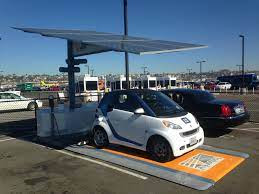Can solar parking lots be used to charge electric cars? EV Future, Solar Carports Cost
A solar carport canopy with 286 solar modules is able to produce about 140 megawatt-hours of energy per year for EV charging, according to a new Scientific Reports study. That's enough to provide electricity to more than 3,000 vehicles per month if each car parks for an hour.
While solar parking lots and EV charging stations are both beneficial components of sustainable infrastructure, the combination of the two is not yet widely implemented. There are several reasons for the limited presence of EV charging stations in solar parking lots:
Cost Considerations: Installing EV charging stations requires additional infrastructure, including charging equipment, electrical wiring, and networking capabilities. The cost of implementing EV charging stations can be significant, especially when combined with the installation of solar panels and associated equipment for power generation. This cost factor may deter some organizations from integrating both technologies simultaneously.
Differing Stakeholders: Solar parking lots and EV charging stations often involve different stakeholders. Solar installations are typically managed by energy companies, while EV charging infrastructure may involve collaborations between charging station operators, property owners, and EV service providers. Coordinating these various stakeholders and aligning their interests can be complex and may slow down the integration of EV charging stations in solar parking lots.
Charging Infrastructure Planning: In some cases, solar parking lots may have been developed before the widespread adoption of EVs and the need for charging infrastructure. Retrofitting existing solar parking lots with EV charging stations may require additional planning and modifications to accommodate the electrical requirements of the charging equipment.
Regulatory and Permitting Challenges: The installation of EV charging stations involves navigating various regulatory and permitting processes. These processes can be time-consuming and may pose challenges related to zoning, electrical permits, utility interconnection agreements, and compliance with local building codes. These factors can further delay the integration of EV charging stations in solar parking lots.
Can solar parking lots be used to charge electric cars?
Yes, solar parking lots can be utilized to charge electric cars. Integrating electric vehicle (EV) charging infrastructure with solar carports, creates a sustainable and convenient charging solution. Here's how it works:
Energy Storage: Some solar parking lots may include energy storage systems, such as batteries, to store excess solar energy for later use, including EV charging.
EV Charging Stations: Electric vehicle charging stations, also known as EVSE (Electric Vehicle Supply Equipment), can be installed within the solar parking lot. These charging stations provide the necessary infrastructure for electric car owners to charge their vehicles.
Direct Solar Charging: In some cases, solar parking lots may feature integrated solar panels with built-in EV charging capabilities. These specialized solar panels have charging ports directly integrated into them, allowing electric vehicles to charge directly from the solar power they generate.
Grid-Tied Charging: Solar parking lots can also be grid-tied, meaning that any excess solar energy generated can be fed back into the grid. This excess energy can be credited or used to offset the electricity consumed by the EV charging stations during times when the solar panels are not producing enough power.
Integrating solar panels with EV charging infrastructure offers multiple advantages, including reducing greenhouse gas emissions associated with transportation, promoting renewable energy usage in the transportation sector, and providing clean and sustainable energy for electric vehicle owners.
Solar Carports - Infrastructure for the EV Future
Solar carports are an emerging infrastructure solution that combines solar power generation with electric vehicle (EV) charging. They are designed to provide shade and shelter for vehicles while simultaneously harnessing solar energy and keeping cars cool while they generate electricity. Here are some key points about solar carports and their significance in the EV future:
Charging Convenience: Solar carports offer a convenient charging option for EV owners, as they provide shaded parking spots and protection from the elements. These carports can be equipped with EV charging stations, allowing EV owners to charge their vehicles while parked, promoting longer-range electric driving.
Grid Resilience and Energy Storage: Solar carports can be combined with energy storage systems such as batteries. This integration enables the storage of excess solar energy generated during the day, which can be used to charge EVs during nighttime or periods of low solar generation. It also enhances grid resilience by providing backup power during emergencies or power outages.
Scalability and Expansion: Solar carport infrastructure can be easily scalable, allowing for the addition of more solar panels and EV charging stations as demand increases. They can be implemented in various locations such as commercial properties, shopping centers, universities, and government facilities, providing a flexible solution for expanding EV charging networks.
Solar Carports Cost?
As a rough estimate, the cost of a parking lot solar canopy can range from $3 to $7 per watt of installed capacity. This estimate includes the cost of solar panels, support structures, inverters, electrical components, installation labor, and other associated expenses.
To provide a more specific estimate, let's consider an example: If you have a parking lot solar canopy with a capacity of 100 kW (100,000 watts), the estimated cost range would be between $300,000 and $700,000. However, it's important to consult with solar installation companies or obtain detailed quotes to get accurate and up-to-date cost information based on your specific requirements and location.
Additionally, it's worth noting that there may be potential financial incentives, such as tax credits, rebates, and grants, that can help offset the cost of installing a solar canopy.

